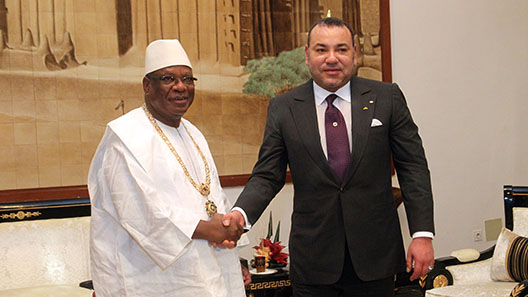
Morocco’s strong economy and political stability make it an attractive portal into Africa for US investors.
Morocco, a bastion of stability on the doorstep of an often-turbulent continent, is a rising economic power. With burgeoning economic and commercial links—across the continent and beyond—and expanding contributions to regional political stability and security, Morocco is an especially attractive portal for investment and a significant US partner in Africa, according to “Morocco’s Emergence as a Gateway to Business in Africa,” an Issue in Focus released today by the Atlantic Council.
![]() Read the Issue in Focus (PDF)
Read the Issue in Focus (PDF)
The piece, written by Atlantic Council Africa Center Director J. Peter Pham and Nonresident Senior Fellow Ricardo René Larémont, examines how investment in Morocco is a potential solution for businesses that want to enter the African market but are wary of existing challenges. The report highlights six of Morocco’s competitive advantages:
- Improving macroeconomic conditions: Morocco is reaping the benefits of aggressive economic reforms, and is now one of the top five recipients of foreign investment in Africa.
- Flagship investments throughout the African continent: Morocco’s foreign direct investment outflows to sub-Saharan Africa have increased more than 40 percent over the course of the last decade, and since 1998 trade with the region has averaged $529 million annually and reached $1 billion in 2008, up from an average of $300 million annually in the 1990s.
- Managerial and financial expertise: Moroccan financial institutions are an increasingly vital conduit for a continent where lack of access to the formal banking sector remains a major impediment to economic growth. Moroccan companies accounted for nearly 9 percent of the business transacted in Africa in 2014, with seventy-seven of them recognized the same year by Jeune Afrique magazine in their top 500 African companies list.
- A natural cultural fit: Morocco embraces its diverse heritage informed by European, Middle Eastern, and sub-Saharan influences, and uses it to enhance its standing throughout Africa and beyond. It has a foot in all three worlds, allowing its companies to comfortably navigate the different cultures and granting them a competitive advantage over competitors.
- Skillful economic diplomacy: King Mohammed VI has harnessed Morocco’s growing economic power to enhance his country’s outreach, and Morocco has made a point of taking a leading role in African and developing country economic forums such as the World Trade Organization and the Group of 77.
- Growing integration into the world economy: In addition to its free trade agreement with the United States, Morocco is integrated into the world economy via a number of other trade pacts, including a longstanding association agreement with the European Union.
The authors conclude by noting that despite Africa’s blossoming consumer base, attractive worker demographics, and abundant natural resources, American businesses have been reluctant to enter the African market space due to overestimations of the costs and risks associated with African corruption and lack of infrastructure. Africa is poised to become one of the world’s largest consumer markets, so American firms’ inability to operate there poses serious challenges to US long-term competitiveness.
Morocco is well-suited to serve as a bridge for American commercial diplomacy into the continent. It is a long-standing US ally and a burgeoning regional power on a critical continent, and it is in the United States’ strategic interests to further deepen economic and commercial cooperation and cultivate stronger political and security partnerships with Morocco.